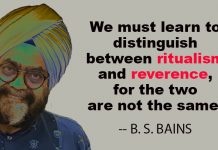
By Gurnam Singh | Opinion |
For some years, there has been a campaign in the UK to have a law that would in effect make ‘Islamophobia’ omit hatred towards Muslims a criminal offence along the same lines as the offence of ‘antisemitism’ which relates to ant-Jewish hate crimes.
Advocates for legislation against Islamophobia, include the All-Party Parliamentary Group (APPG) on British Muslims, the Muslim Council of Britain (MCB), and the Labour Party. They all argue that a legal definition of Islamophobia, which they often define as a form of anti-Muslim racism, is crucial to better understand, quantify, and effectively combat the unacceptable rise in hate crimes, social inequalities, and discrimination experienced by Muslim communities in the UK
However, not all people are supportive of this move, for varying reasons. One of the most notable opponents is The Network of Sikh Organisations (NSO).
NSO contends that existing hate crime laws already provide sufficient protection and that introducing a broad definition of Islamophobia could undermine the religious freedoms of Sikhs and other faith groups. They go onto argue that such a definition might disadvantage Sikhs by restricting their ability to practise and express their faith. As Lord Singh of Wimbledon, and director of NSO, argues “many Sikh beliefs and practices, though essential to the faith, might be deemed offensive under an expansive interpretation of Islamophobia”. The NSO further warned that defining Islamophobia too broadly could lead to the censorship of Sikh history, particularly where it references oppressive Muslim rulers, and that religious practices such as the prohibition of halal meat could be unfairly labelled as Islamophobic. Singh maintained that it would be illogical and unjust to curtail one community’s religious freedoms in order to protect another’s sensitivities from subjective offence.
I, too, object to the introduction of this legislation, though my concern is more general regarding the principle of freedom of expression and thought. For me, any such proposed legislation, whether relating to Islam, Christianity, Hinduism, Sikhism, Judaism, or any other belief system, that risks impinging on our fundamental right to preserve our historical narratives and to criticise ideas, religious or secular. My fear is that these demands are a further manifestation of the politics of difference, whereas universal principles that protect us all are increasingly being sacrificed in the name of cultural relativism.
The distinction between critique, criticism and hate is not always clear-cut. If we are not careful, attempts to outlaw anything that might be deemed “offensive” could lead us down a slippery slope toward censorship. In a society that values freedom of thought and expression, the right to question, challenge, and even satirise belief systems must remain protected.
This is especially important given the diversity of interpretations within faith traditions themselves. Islam, for example, encompasses a wide spectrum of thought, from Sunni and Shia schools to the Ahmadiyya community to numerous sub-sects. There is much disagreement between these traditions to the extent that they are deemed heretical and banned in some Muslim-majority countries. Legislation intended to protect one interpretation of a religion could, unintentionally, suppress dissent within that same religion.
Antisemitism should rightly be treated as a hate crime because it targets Jews as a distinct ethno-religious community rather than an ideology. It manifests in hostility, harassment and violence against individuals and institutions, causing real and measurable harm, and therefore warrants legal protection similar to that afforded to other vulnerable groups. By contrast, Islam is an ideology or belief system, not a people. While Muslims, as individuals, deserve full protection under existing hate-crime laws against threats, discrimination, or violence, extending criminal sanctions to “Islamophobia” risks conflating criticism of an idea with hatred of people.
This distinction is crucial: laws should protect persons from harm, not belief systems from scrutiny. In a free society, safeguarding individuals from hate must never come at the expense of our right to question or criticise any set of beliefs, religious or secular. Faith systems should not require legal protection from scrutiny. Ideas, unlike individuals, cannot be harmed, only tested, refined, or rejected. Any legislation that restricts our ability to question or criticise religious or non religious ideological systems would ultimately weaken one of the most fundamental principles of a liberal democracy: the freedom to think and speak freely.
Of course, genuine hate, manifesting as hostility, incitement, or violence toward individuals or groups, is wholly unacceptable and must be condemned and dealt with under existing laws, and sure, if they need tightening, thats fine. But in a free and open society, disagreement and debate are not only inevitable; they are essential.

Gurnam Singh is an academic activist dedicated to human rights, liberty, equality, social and environmental justice. He is an Associate Professor of Sociology at University of Warwick, UK. He can be contacted at Gurnam.singh.1@warwick.ac.uk
* This is the opinion of the writer and does not necessarily represent the views of Asia Samachar.
RELATED STORY:
The Demise of the Akali Dal and the Badal Dynasty: What Next for the Panth? (Asia Samachar, 5 Aug 2024)
ASIA SAMACHAR is an online newspaper for Sikhs / Punjabis in Southeast Asia and beyond. You can leave your comments at our website, Facebook, Twitter, and Instagram. We will delete comments we deem offensive or potentially libelous. You can reach us via WhatsApp +6017-335-1399 or email: asia.samachar@gmail.com. For obituary announcements, click here

































